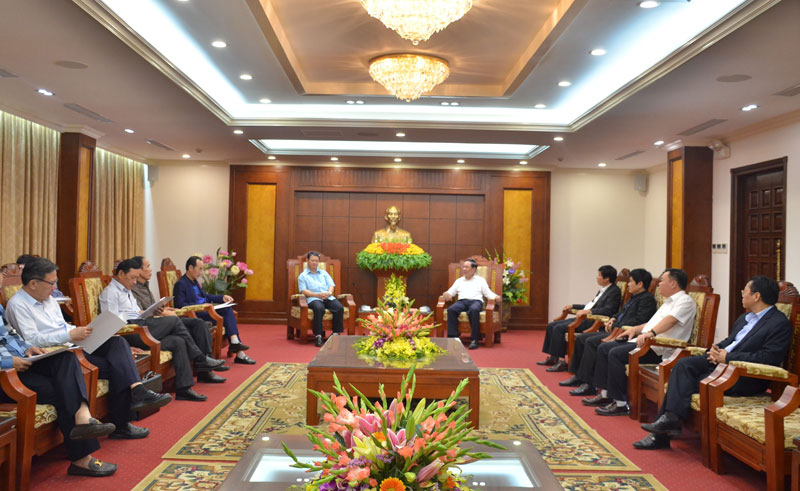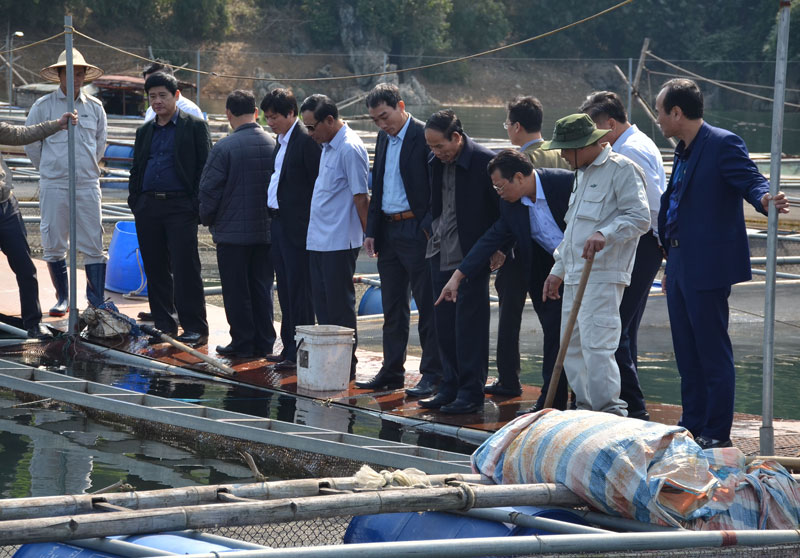
(HBO) – A delegation from Lao Cai province, led by Secretary of the provincial Party Committee and Chairman of the provincial People’s Council Nguyen Van Vinh, paid a working visit to Hoa Binh province on March 9.
The
delegation was welcomed by Secretary of the Hoa Binh Party Committee Bui Van
Tinh, Deputy Secretary of the provincial Party Committee and Chairman of the
provincial People’s Council Tran Dang Ninh, and Vice Chairman of the provincial
People’s Committee Nguyen Van Dung.

Secretary of provincial Party Committee
Bui Van Tinh and local leaders receive the Lao Cai delegation.
Outstanding achievements in socio-economic development of Hoa Binh province
were highlighted at the meeting. Tinh introduced the guests of the province’s typical
economic models and arrangement to streamline local organisation in line with
the spirit of the Resolution 39-NQ/TW.
Hoa Binh province is developing citrus fruit areas in Cao Phong, Kim Boi, Tan
Lac and Lac Thuy districts. Currently, the province is home to 8,600 hectares
of citrus trees, 3,700 hectares of which are set aside for business purpose,
Tinh underlined, adding that the locality has worked to branch out caged fish
breeding on Da River with more than 7,700 tonnes of fish raised in over 4,000
floating cages.
The province has 51 new style rural areas, eight industrial parks housing 442
projects including 30 FDI projects and 2,318 enterprises, he said, noticing
that the province has grasped investors’ interest in tourism and golf course
construction.
Nguyen Van Vinh, for his part, spotlighted Lao Cai’s strengths like local
tourism attracting over 3.5 million tourists and value of imports and exports
reaching over 2.58 billion USD in 2017. The province has over 4,000 busineses
with total registered capital of 60 trillion VND.
Under the Politburo’s Resolution 39-NQ/TW, the province streamlined and
rearranged local apparatus personnel, saving some 70 billion VND in 2017.
Lao Cai province’s working group visited outstanding economic models in Hoa
Binh like orange plantation in Cao Phong district, caged fish breeding on Hoa
Binh lake, Luong Son industrial zone and Hoa Binh hydropower plant.
Leaders from both sides discussed measures to promote cooperation opportunities
between the two localities.
Tran Dang Ninh, Deputy Secretary of the
Hoa Binh Party Committee and Chairman of the provincial People’s Council, and the
Lao Cai delegation group visit the caged fish breeding model on Da River.
In Hoa Binh province, 11 traditional craft villages with more than 400 small-scaled production households have put in place a clean and green production model, establishing new standards for sustainable development. Waste collection sites and wastewater treatment facilities have been meticulously managed by local residents.
To make it easier for the residents to handle administrative procedures, Yen Bong Commune (Lac Thuy District) has identified the administrative reform as one of its key tasks. By implementing a range of synchronized solutions, the commune has seen the positive changes in the administrative reform, meeting the needs of its people.
Mai Chau district has firmly established itself as a standout destination on Vietnam’s tourism map, attracting both domestic and international visitors with its breathtaking landscapes, rich ethnic culture, and warm hospitality. However, beyond its natural and cultural charm, a secure and well-managed tourism environment has added to Mai Chau’s appeal.
As Vietnam enters a new phase of economic and administrative reform in 2025, Hoa Binh province is stepping up its efforts to streamline governance, boost economic growth, and attract investment.
The Hoa Binh provincial People's Committee held its monthly meeting on March 26 to review the progress of key projects, assess budget revenue and public investment disbursement, provide feedback on draft documents for submission to the provincial Party Committee's Standing Board, and discuss other important matters related to the committee's governance activities.
Playing a key role in Hoa Binh province’s economic development, Luong Son district has been focusing on science and technology development, innovation, and digital transformation.




